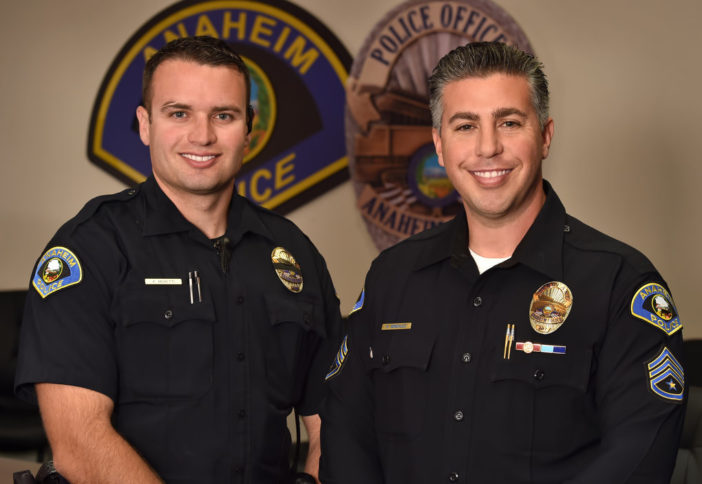Residents of West Edithia Avenue had been complaining about the same house for decades.
The “drug house” was frequently mentioned at neighborhood watch meetings and in calls to the Anaheim Police Department for crime in the 1500 block of West Edithia Avenue.
The police had tried all the usual tactics, so when Sgt. Daniel Gonzalez and Officer Kevin Moretti of the Central Community Policing Team decided to tackle the issue, they knew they had to think outside the box.
“When I had the opportunity to oversee this unit in December 2016, we started looking at Edithia and what our response could be to deal with that long-term problem,” Gonzalez said. “Through our research we found out it had been a problem for approximately 20 years.”

Anaheim PD Officer Kevin Moretti, left, and Sgt. Daniel Gonzalez of the Central Community Policing Team discuss how they approached the problem on West Edithia Avenue.
Photo by Steven Georges/Behind the Badge OC
Gonzalez and his team discovered that the multitude of crimes connected to that address included homicide, kidnapping, robbery, drug sales, possession of controlled substances, recovered stolen vehicles, probation and parole violations, possession of stolen property, driving under the influence, forgeries, and counterfeit currency investigations.
“Not a week went by there wasn’t some kind of police activity for some reason or other,” neighbor Julie Cline said.
Recently, the tree in the front yard caught fire. Another time, police were called because a topless woman was picking weeds in the front yard in the afternoon. Neighbors raised their fences to prevent people jumping into their yards when police arrived.
“If there’s a type of crime, it probably happened there,” Moretti said.
Neighbors Julie and Chuck Cline recall a shooting that happened on a Sunday afternoon within 6 months of moving into their home on West Edithia Avenue 24 years ago.
“I was getting ready, doing something in the kitchen, and I heard what I thought was gunshots,” Julie Cline said. “I thought, ‘No, that can’t be right,’ so I looked out and there was a motorcycle across the street and two guys sitting on the motorcycle and firing.”
The Clines said they live in a quiet, peaceful neighborhood — with the exception of one house.
“We have no problem with any of our other neighbors,” Julie Cline said. “It’s a really nice neighborhood.”
From 2012 to 2017, police received 242 calls related to that address. In addition, they recorded about 133 criminal arrests related to that address. In contrast, the 25 other homes on the street averaged about one call for service annually per home, Gonzalez said.
The team began researching civil abatement, which uses a legal process to penalize homeowners for frequent illegal drug activity causing a public nuisance.
Civil abatement has been successfully used by other cities nationwide to stop crime.
“We wanted to try to avoid litigation if possible and try to see if we could form a partnership with the owners of the residence,” Gonzalez said.

Anaheim PD Lt. Curtis Faulkner, formerly of the Central Community Policing Team.
Photo by Steven Georges/Behind the Badge OC
“These nuisance crimes are some of the more difficult things to deal with because you’re talking about quality of life in the community around where the problem is occurring,” said Lt. Curtis Faulkner, who oversaw the team during the project.
Over the years, the Clines said they got used to the police visits and police helicopter circling overhead at night. Last year, the family was talking in front of their garage with a visiting relative when police cars arrived.
“His eyes are big, round like saucers and he says, ‘Police! There’s police!’ And my husband and I just looked at each other. It didn’t faze us,” Julie Cline said. “I said, ‘That happens quite often around here.’ That just goes to show how used to it my husband and I were that we didn’t bat an eyelid at all these cop cars showing up.”
During an initial meeting with police the owners expressed a willingness to clean litter and trash from the property and to work with authorities to end criminal activity, Gonzalez said. To help, the city offered a large trash bin for three days, but it was mostly empty when officials came to collect the bin.
“(The owner) was allowing a lot of transients to come in, and other friends of friends, that could come and stay,” Moretti said. Moretti said officers would often arrive to find up to 20 people living at the house. “We provided information on how to formally evict people, and to call us if anybody refused to leave.”
“A few times, (the owner) expressed he was scared of the people living in his own house,” Moretti said. “They had victimized him.”
However, crime calls at the house increased in the months following the meeting, with 14 arrests between Jan. 12 and April 14, 2017.
“Many times, they thanked us for coming and in making these arrests and telling them they need to do something to solve the crime at their house,” Moretti said.
In May 2017, then-APD Chief Raul Quezada met with the owner. In the months following that meeting, police arrested 19 people at the house, for weapons violations, sales of narcotics, and other crimes.
“(They) admitted the situation had deteriorated beyond control and expressed a desire to sell the property because, in their opinion, it was the only remedy to cease criminal activity,” Gonzalez said.
The owner sold the house in December 2017 to a private investor who cleaned and upgraded the home. The police haven’t had any arrests or issues on that property since the house was sold.
The change in ownership brought peace of mind to neighbors, too.
“Now I can order things by mail because they put (packages) on my doorstep and if I don’t come home for an hour, it’s still on my doorstep,” Julie Cline said. “It used to get legs and walk off.”
“It’s just like night and day now,” she said. “Huge difference.”
Selling the property allowed the owner to avoid the civil abatement, which could have included an injunction, a fine of $25,000 per defendant, and a potential one-year property closure. Anaheim hasn’t yet had to move forward with a civil abatement, but police see it as a great tool for law enforcement when other methods aren’t working.
“Everybody for the past 20 years had tried to go out there and arrest the problem away, and it didn’t work,” Faulkner said. “They came up with an idea on how to deal with it and they put a different kind of pressure on the homeowners to do something to make sure those issues didn’t surround that property and, ultimately, selling it was one way of doing that.”
The Central Community Policing Team used a similar tactic on a house in the 800 block of South Olive Street, which had been a long-time gang magnet.
“For many years it became a place where rival gang members came looking for crimes of opportunity,” Gonzalez said. “Unfortunately, the alley behind this gang house was the scene of two gang-related homicides.”
When the residents didn’t respond to police calls or visits, officers contacted the homeowner out of state and explained the situation. Anaheim’s code enforcement got involved also, citing the address for multiple violations, including trash along the side of the house, plastic used to replace broken windows, and a modified detached garage that had been turned into a living space without the proper permits.
“(We) expressed our concerns about the constant felony graffiti, the gang assaults, the prior homicides, the other gang shootings that occurred in that area,” Gonzalez said. The tenants had lived there for so long that the home had become a destination for gang members, he said.
Ultimately, the owner evicted the tenants and sold the property in July 2017.
“When you look at our mission and our goal of improving the quality of life for the community members who not only live here but visit our community, they’ve been doing a great job,” Gonzalez said of the Central Community Policing Team, which Lt. Frank Hale now oversees. Acting Chief Julian Harvey recognized team members with Chief’s Commendations for both victories.
“We have to look at these other options of nontraditional responses,” Gonzalez said. “Sometimes, making a lot of arrests isn’t the answer.”
The Clines would see the same officers visiting the house month after month. Though the police would arrest people, they’d return the next day. Now, for the first time in two decades, West Edithia Avenue is quiet.
“It’s a miracle the police were able to do that,” Julie Cline said. “Great job to the police, as far as we’re concerned.”
 Behind the Badge
Behind the Badge



